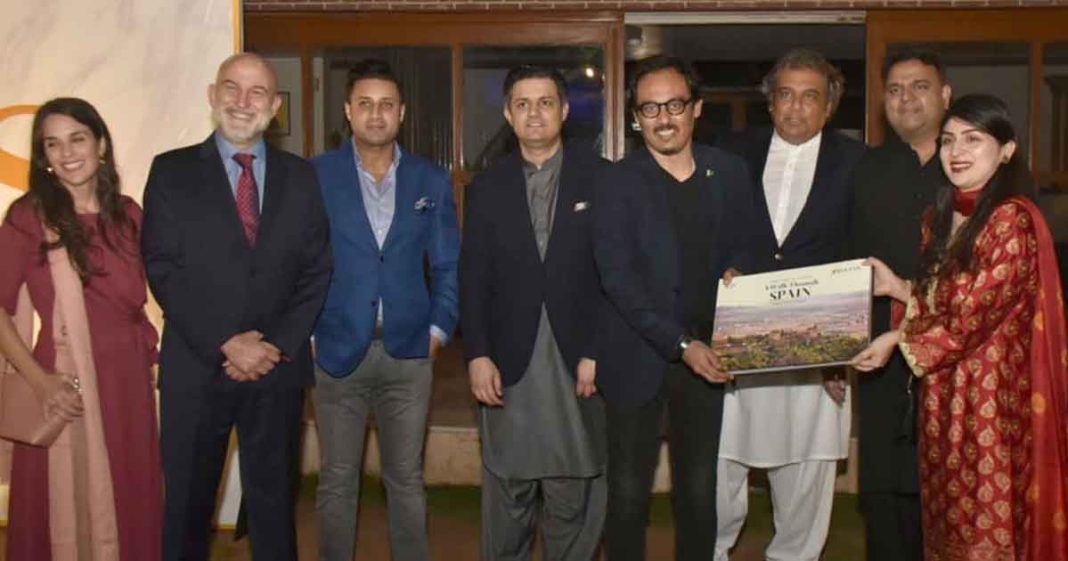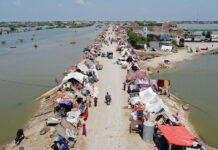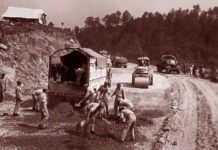Having just returned from my vacation in Spain – got to see Madrid, Valencia, and Alicante – it was great to come back and be invited to one of the first few events held in the diplomatic community in the post-Corona vaccination era (if we can call it that). The Spanish Embassy and JS bank held an event showcasing a beautiful coffee table book on the Islamic history of Spain ‘Walk through Spain‘.
Ammar Zaidi and Mawish Maulvi put together the refreshing book, with pictures captured by Ammar, who spent 25 days traveling through Spain, went to over 16 destinations, in October 2019, and captured the historical Islamic spirit of the cities. Besides the renowned Islamic towns of Cordoba, Toledo, and Granada, Ammar also visited several other cities and remote villages, where Pakistanis rarely venture, including Figueres (Dali’s city), Girona, and the medieval village Besalu, which has a population of around 2500 people.
Through his eyes, we see the attraction and history of the country. From the haunting feel of Toledo where you still feel eyes watching you from the windows, the book also includes chapters on Valencia –which they have titled the Jewel of Spain and Barcelona, termed the Temptress.
Lucky for us that he did, since the past two years during corona, most of us have been stuck indoors; it will be a vicarious pleasure for many, and indeed I think the Spanish embassy will get an uptick of tourist visa requests!
The book started from an invitation by the Spanish embassy to explore their country, after the Ambassador saw photographs by Ammar on Karachi’s street photography. The coffee table book full of striking and picturesque pictures by Ammar Zaidi and textual descriptions by Mawish Maulvi evocatively captures the remnants of the Muslim empire’s golden age.
Photographs of the Alhambra Palace in Granada, Alcazar of Toledo, and the Arab baths in Girona are a must to see. Islam entered Spain in 711 AD, and Muslim rulers ruled parts of Spain until 1492, when the Kingdom of Granada finally fell. The book intertwines Ammar’s journey of Spain’s Islamic past on cobbled streets with friendly faces, street artists, and brightly colored modern buildings.
Ammar’s laudatory objective is to make his photography build bridges between diverse cultures, a purpose that is badly needed in today’s world as globalization reaches out to all and threatens many for its potential disruption.
Mawish, educated at the University of Edinburgh and London School of Economics, was very clear that as important as the digital space is today, there is nothing like holding a coffee table book in your hands and I must say Lahore’s Topical Press delivered an international standard. For Mawish the pictures exploring Spain’s history and smaller towns and villages give the reader a different experience from visiting any country as a tourist and just going to its capital city.
The current Spanish Ambassador to Pakistan, H.E. Manuel Durán Giménez-Rico, has been here almost three years and has been an active community member despite the slowdown we witnessed in the past nearly two years during the Corona pandemic. The Spanish Netflix drama ‘Money Heist’ has been one of Pakistan’s top ten trending flicks.
The event was attended by several ministers and others, including Ali Zaidi (Maritime Affairs), Fawad Chaudhry (Information Minister), Shibli Faraz (Science and Technology), Hammad Azhar (Energy), and former minister Zulfi Bukhari among others. The project was funded by JS Bank and Mahvash & Jahangir Siddiqui Foundation. The foundation is known for supporting Pakistan’s art and culture.
Indeed it is one of the rare Pakistani foundations and corporates that engage in such work. Imran Ali, Chief Operating Officer, JS Bank, personally got involved in pushing this project forward and explained how supporting this coffee table book not only promoted their cause to help young Pakistanis in their artistic ventures but also allowed the bank to showcase Spain’s Islamic past, which gave them particular pleasure.
Both authors are planning another project, and if I am not giving away too much, it’s on Pakistan in 1947 based on personal stories and interviews.





